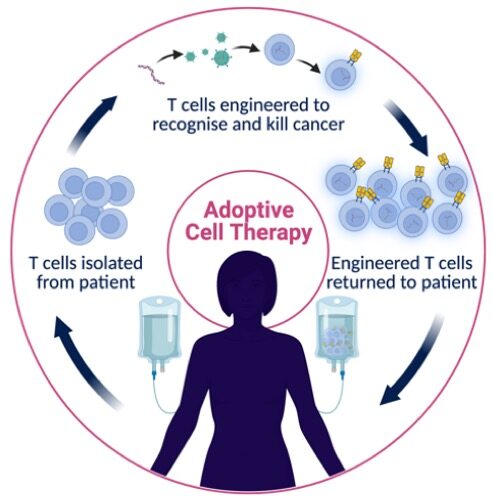How TCR-T cell
therapy works
T cells are immune effectors that recognize and kill malignant cells. The therapeutic use of patient’s own T cells, also known as adoptive cell therapy, has revolutionized cancer treatment and clinical outcome.
Autologous adoptive T cell therapy relies on the transfer of T cells that are derived from the patient’s own T cells are gene-engineered to express a tumor- specific receptor (in this case, a TCR), after which T cells are expanded and re-infused back into the patient.
Inherent to a TCR’s function is its ability to screen and eradicate diseased and cancerous cells.T cells gene- engineered with a TCR have already demonstrated clinical benefit in patients with advanced solid tumors that are not responding to standard of care.
Autologous adoptive T cell therapy relies on the transfer of T cells that are derived from the patient’s own T cells are gene-engineered to express a tumor- specific receptor (in this case, a TCR), after which T cells are expanded and re-infused back into the patient.
Inherent to a TCR’s function is its ability to screen and eradicate diseased and cancerous cells.T cells gene- engineered with a TCR have already demonstrated clinical benefit in patients with advanced solid tumors that are not responding to standard of care.
Using immune cells to target and eliminate cancer
T cell therapies hold great promises for patients with previously untreatable cancers. However, further improvements are needed to progress these therapies.
More solid tumor-specific targets are required to broaden the scope of eligible cancer types and patient populations. In addition, tumors sustain a hostile environment, hampering the immune system by different mechanism. In order to unleash the T cells full potential, we should augment the T cells in order to drive deeper and more durable clinical responses in multiple solid tumors.
T cell therapies hold great promises for patients with previously untreatable cancers. However, further improvements are needed to progress these therapies.
More solid tumor-specific targets are required to broaden the scope of eligible cancer types and patient populations. In addition, tumors sustain a hostile environment, hampering the immune system by different mechanism. In order to unleash the T cells full potential, we should augment the T cells in order to drive deeper and more durable clinical responses in multiple solid tumors.


